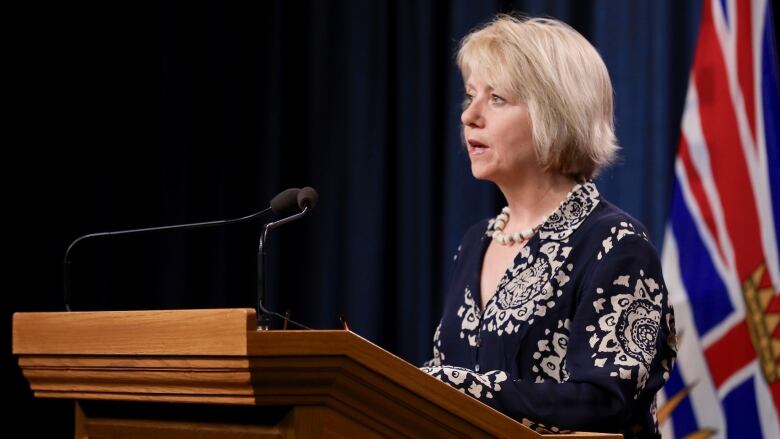Dr. Bonnie Henry says COVID-19 is still 'a risk everywhere'
No new deaths recorded in B.C., 11 new cases added to the province's tally

After another day with no new deaths from COVID-19, B.C. Provincial Health Officer Dr. Bonnie Henry is reminding the public that it is still necessary to avoid crowds and take other measures against the spread of the disease.
On Tuesday, Henry announced that B.C. has confirmed 11 new cases of COVID-19, including 10 new test-positive cases and one that has been epidemiologically linked to previous cases. The province has had2,756 cases to date.
Right now, there are 172 active cases of the virus, of which 11 are in hospital, including five in intensive care. A total of 2,416 people have recovered from their illness.
No new deaths have been reported, leaving the total to date at 168.
Henry said that while businesses are gradually beginning to reopen, it's important to take this stage of the pandemic response one step at a time.
"We are being thoughtful and measured in our response and we are adapting as we go," she said.
Crowds continue to be out of the question for the foreseeable future, Henry added.
"We will have the opportunity to do these things again, but just not now," she said. "It only takes one person in a crowded setting to spread it to many others."
Tuesday's update included one new outbreak in a long-term care home, bringing the number of active outbreaks in these facilities to five.
Meanwhile, Henry weighed in on a local political controversy in Vancouver whether to fully reopen Stanley Park to vehicle traffic.
She called the current restriction on cars to allow room for walking and cycling "a really good thing" that has given people a way to get outside and be active during the pandemic.
"I personally would be in favour of keeping it that way and reducing the number of cars on our roads and making our cities more amenable to active transport," Henry said.
Lessons learned about PPE stockpile
Also Tuesday,Health Minister Adrian Dix gave an update on the province's supply of personal protective equipment (PPE).
Since the start of the pandemic, B.C. has acquired5.5 million N95 respirators, twomillion eye protection pieces, 40 million pairs of gloves and twomillion gowns.
He said that while B.C. had a stockpile of this equipment before COVID-19 hit the province,it's clear now it wasn't enough. For example, at the height of the pandemic here,12,000 N95 respirators were being used every day, compared to 1,800 a day before COVID-19.
"We've definitely learned from our experience," he said. "We need to stock up."
Dix added that a PPE testing laboratory is being established in Vancouver to help with that process.
Watch | Health Minister Adrian Dix outlines the state of B.C.'s PPE stockpile:
Watching for spikes in infection
Henry also addressed a new outbreak of the disease in Beijing, as well as the introduction of new cases to New Zealand days after it was declared free of COVID-19.
"It just goes to show what we have been saying all along: once this virus is anywhere, it's a risk everywhere," Henry said.
She explained that those examples show why B.C. needs to track every case of COVID-19 carefully.
"We've managed to flatten our curve but we cannot get rid of this virus when we still have people moving back and forth," she said.
Henry and Dix have said they are closely monitoring infections as the province rolls out its COVID-19 restart plan, which has allowed restaurants and personal service establishments to reopenunder new guidelines.
EarlierTuesday, Prime Minister Justin Trudeau announced an eight-week extension to the Canada Emergency Response Benefit (CERB).
The $2,000-per-monthstipend, which started in mid-March,was originally set to last 16 weeks.
The prime ministeralso extended theCanada-U.S. border closure by another 30 days, keeping itin place until late July.
If you have a COVID-19-related story we should pursue that affects British Columbians, please email us at impact@cbc.ca.
With files from Courtney Dickson













_(720p).jpg)


 OFFICIAL HD MUSIC VIDEO.jpg)
.jpg)



























































































